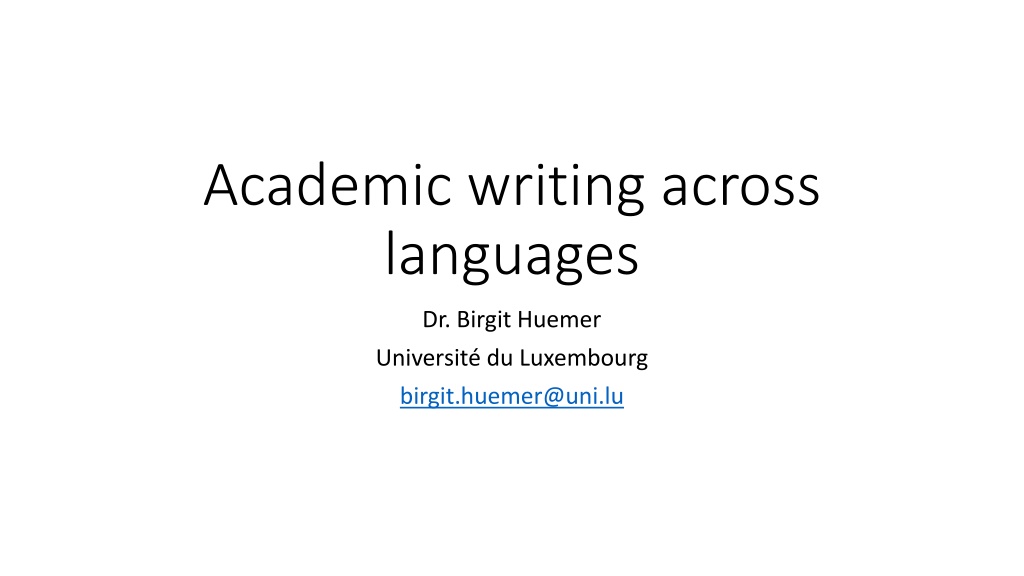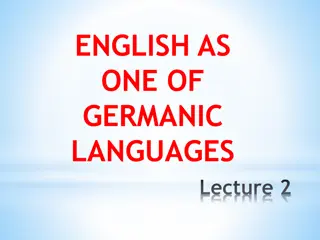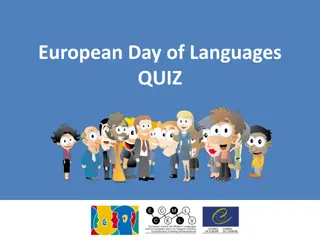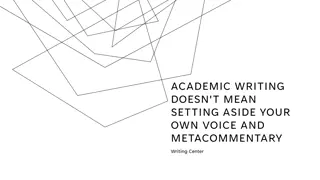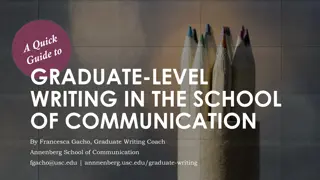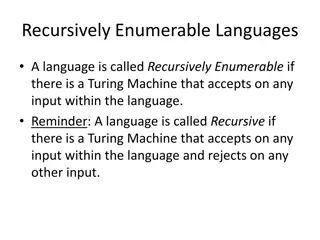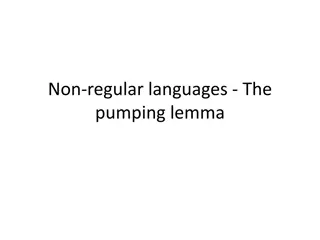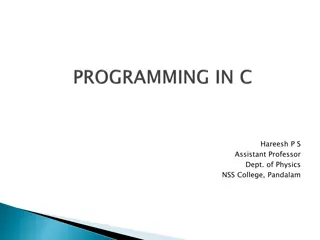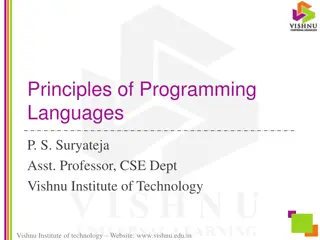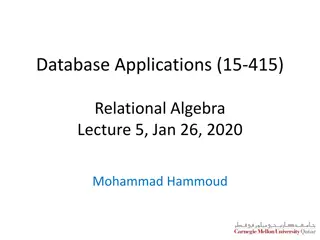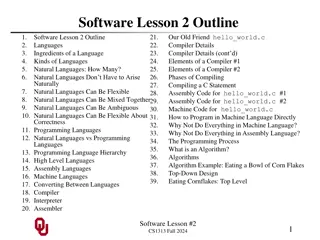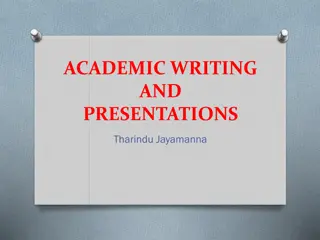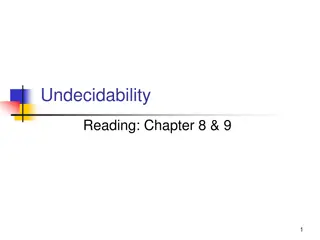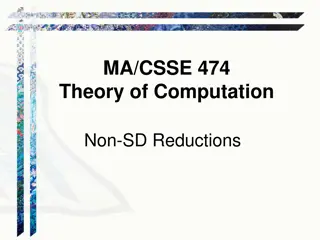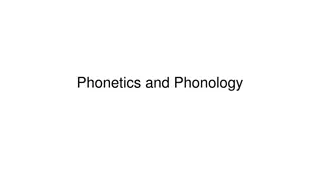Understanding Academic Writing Across Languages: Challenges and Solutions
Explore the historical development of languages in academia and science, equivalence issues, written academic genres, evolution from Latin to national academic languages, and the importance of a common language in academia. Dive into the specialized text structures, syntax, idiomatic phrases, and practices for intertextual references in academic languages. Delve into the equivalence problems in lexis and idiomatic phrases, particularly in English and German. Gain insights into the use of words with Latin roots and everyday words that acquire new meanings in academia.
Download Presentation

Please find below an Image/Link to download the presentation.
The content on the website is provided AS IS for your information and personal use only. It may not be sold, licensed, or shared on other websites without obtaining consent from the author. Download presentation by click this link. If you encounter any issues during the download, it is possible that the publisher has removed the file from their server.
E N D
Presentation Transcript
Academic writing across languages Dr. Birgit Huemer Universit du Luxembourg birgit.huemer@uni.lu
Content Historical development of the languages of academia and science Equivalence problems between the languages of academia and science
Written academic genres Students: notes, assigments like essays, protocols, reports etc. Professional academics: journal articles, conference papers, research proposals etc
Historical development From Latin to national academic languages in Europe in the 18th and 19th century.
The common language of academia Terminology common language of academia
The common language of academia = Basic lexical inventory of all academic and scientific communication in one language.
The common language of academia fundamentalen sprachlichen Mittel [ ], derer sich die meisten Wissenschaften [Disziplinen] gleich oder hnlich bedienen. Ehlich (1993: 33) fundamental linguistic means [...] which most disciplines use in the same or a similar way.
Academic language use Le fran ais scientific (est) en chute libre Das Franz sisch (ist) als Wissenschaftssprache im freien Fall French as academic language (is) in free fall Ammon (1998)
Each academic language has developed specialised text structure syntax lexis idiomatic phrases practices for intertextual reference modalisations=hedges
Equivalence problems lexis and use of idiomatic phrases
Equivalence problems English German use of words with latin roots use of everyday words, which get new meaning in academic contexts
Equivalence problems etwas herausarbeiten etwas beleuchten
Equivalence problems etwas herausarbeiten to work out to carve out
Equivalence problems Methodisch k nnen zwei Wege beschritten werden Im Folgenden st tze ich mich auf die Untersuchung von
Equivalence problems Other concepts other ways of thinking
Birgit Huemer, Eve Lejot, Katrien L. B. Deroey (Hg.) Academic writing across languages: multilingual and contrastive approaches in higher education L criture acad mique travers les langues : approches multilingues et contrastives dans l enseignement sup rieur Wissenschaftliches Schreiben sprach bergreifend: mehrsprachige und kontrastive Ans tze in der Hochschulbildung
Hedges in academic writing How authors take position
Hedges in academic writing to make things fuzzier or less fuzzy Lakoff (1972: 195)
Hedges A penguin is sort of a bird A penguin is a bird Lakoff 1972
Hedges - Modalisierung Academics refer to other authors to support their own statement and therefore present the referenced statement in a particularly positive light. Academics want to distance themselves from a certain statement. Academics add a degree of uncertainty to the truthfulness of a particular statement in order to make readers aware that certain facts should be further investigated or questioned. Academics add reinforcement to the truthfulness of a particular statement in order to convince the reader of the accuracy and/or importance of the statement.
Adding Certainty and presenting statement in positive light Clinical reports proof that it has a calming effect upon patients. Vold 2019: 85
Taking distance, adding uncertainty In other words, it seems that what Rieber has in mind is the sort of case in which a communicative act provides DIRECT EVIDENCE for information rather than INDIRECTEVIDENCE. Vold 2019: 85
Taking distance, adding uncertainty Quality-of-life data were missing at 1 or more time points in 19% of participants, and we cannot entirely exclude the possibility that differential loss of participants may have affected our results. However, we consider this unlikely because treatment assignment was not significantly different among women with complete vs incomplete data. Vold 2019: 85
Hedges - Modalisierung to subjectify statements, to relativize responsibility for the truthfulness of the statement, to limit the degree of certainty or doubt as to the validity of a finding, to avoid absolute statements, to transfer responsibility for statement content, to express personal attitudes and to evaluate facts. Clemen (1998:14)
Linguistic resources Modal verbs: can, could, may, might, must, shall, should, will, would Modal adverbs: possibly, unlikely, perhaps, conceivably, definitely, Epistemic verbs: proof, consider, believe, assume, suggest, c Epistemic expressions: it seems that, It might be suggested that, it could be the case that, the sort of case
Language comparison Studies show that there are considerable cultural differences in the use of these linguistic means in academic texts. (Vold 2019) Especially the writing of texts in an L2 seems to cause difficulties in this respect, since it concerns fine linguistic nuances, which one must recognize. (Rheindorf 2019)
Language comparison In German academic language many and very differentiated hedges are used. Therefore, German scientists tend to maintain these habits and use too many hedges when writing a academic text in L2. In this way, they deviate from the standards of other academic cultures, which negatively affect communication and lead to misunderstandings with members of their scientific community.
Ammon, Ulrich (1998). Ist Deutsch noch internationale Wissenschaftssprache? Englisch auch fr die Lehre an den deutschsprachigen Hochschulen. Berlin/New York: de Gruyter. Clemen, Gudrun (1998). Hecken in deutschen und englischen Texten der Wirtschaftskommunikation. Eine kontrastive Analyse. Univ. Dissertation. Siegen. Ehlich, Konrad (1993). Deutsch als fremde Wissenschaftssprache. Jahrbuch Deutsch als Fremdsprache 19, 13-42 Fandrych, Christian (2002). Herausarbeiten vs. Illustrate: Kontraste bei der Versprachlichung von Sprechhandlungen in der englischen und deutschen Wissenschaftssprache. In Europ ische Wissenschaft: Europ ische Perspektiven. ed. by Ehlich, K. M nchen. Gardner, Sheena (2019). Pedagogical insights from contrastive studies of English and Chinese writers in the BAWE corpus. In B. Huemer & E. Lejot, Eve & K. Academic writing across languages: multilingual and contrastive approaches in higher education (= Schreibwissenschaft Band 1). Wien: B hlau, S. 105-126. Huemer, Birgit & Rheindorf, Markus (2015). Developing a German-English Dictionary of the Common Language of Academia. Journal of Academic Writing 5(1), 29-41. Huemer, Birgit & Lejot, Eve & Deroey, Katrien (2019). Academic writing across languages: multilingual and contrastive approaches in higher education (= Schreibwissenschaft Band 1). Wien: B hlau. Lakoff, George (1972). Hedges: A Study In Meaning Criteria And The Logic Of Fuzzy Concepts. University of Chicago Press. Rheindorf, Markus (2019). Doing stance and engagement: Austrian graduate students awareness of reporting signal and attitude in German (L1) and English (L2). In B. Huemer & E. Lejot, Eve & K. Academic writing across languages: multilingual and contrastive approaches in higher education (= Schreibwissenschaft Band 1). Wien: B hlau, S. 209-232. Vold, Eva (2019). L att nuation travers les langues et les disciplines : une approche plurilingue et interculturelle pour enseigner la r daction scientifique dans des contextes multiculturels. In B. Huemer & E. Lejot, Eve & K. Academic writing across languages: multilingual and contrastive approaches in higher education (= Schreibwissenschaft Band 1). Wien: B hlau, S. 79-103.
